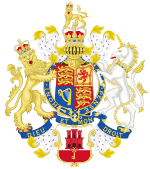
The Democratic Party for a British Gibraltar (DPBG) was a Pro-British political party in Gibraltar.
Peter Joseph Isola, OBE, GMH, was a Gibraltarian politician and lawyer. He succeeded Maurice Xiberras as leader of the Democratic Party for a British Gibraltar (DPBG).
The Lithuanian Christian Democratic Party was a Christian-democratic political party in Lithuania.

General elections were held in Gibraltar on 16 January 1992. They were won by the Gibraltar Socialist Labour Party led by Joe Bossano, whose candidates took 73.1% of the popular vote and eight of the 15 contested seats, retaining control of the Gibraltar House of Assembly.
The Gibraltar Legislative Council was the legislature of Gibraltar created in 1950 and sat until the creation of the Gibraltar House of Assembly in 1969.

The Farmers' Assemblies was a conservative political party in Estonia. Led by Konstantin Päts, it was the ruling party for most of the inter-war period.
The Christian People's Party was a political party in Estonia between 1919 and 1931.

General elections were held in Gibraltar on 24 March 1988. The elections were a watershed in Gibraltar politics, as they saw the first win by the Gibraltar Socialist Labour Party (GSLP), led by Joe Bossano, whose candidates took 58% of the popular vote and eight of the fifteen seats available in the Gibraltar House of Assembly. Bossano's party took control away from the Association for the Advancement of Civil Rights (AACR), under outgoing Chief Minister Adolfo Canepa. The AACR had been the dominant political party in Gibraltar politics for over forty years and had won every election but one since 1945. After this, it was never to win another general election, while Bossano was to remain in office continuously for eight years, from 25 March 1988 to 17 May 1996.

General elections were held in Gibraltar on 26 January 1984. The AACR administration of Sir Joshua Hassan was elected for a further term.

General elections were held in Gibraltar in 1950. The Association for the Advancement of Civil Rights emerged as the largest party in the new legislature, winning 3 of the five elected seats.

General elections were held in Gibraltar in 1953. The Association for the Advancement of Civil Rights remained the largest party in the legislature, winning three of the five elected seats.

General elections were held in Gibraltar in 1956. The Association for the Advancement of Civil Rights remained the largest party in the legislature, winning four of the seven elected seats.

General elections were held in Gibraltar in 1959. The Association for the Advancement of Civil Rights remained the largest party in the legislature, winning three of the seven elected seats.

General elections were held in Gibraltar in 1964. The Association for the Advancement of Civil Rights remained the largest party in the legislature, winning five of the eleven seats.

General elections were held in Gibraltar in 1969. The Association for the Advancement of Civil Rights remained the largest party in the House of Assembly, winning seven of the 15 seats. However, the opposition Integration with Britain Party and Isola Group held eight seats between them and were able to form a government, marking the first time since 1950 that the AACR had been out of power.

General elections were held in Gibraltar in 1976. The result was a victory for the Association for the Advancement of Civil Rights, which won eight of the 15 seats in the House of Assembly.

General elections were held in Gibraltar on 6 February 1980. The result was a victory for the Association for the Advancement of Civil Rights, which won eight of the 15 seats in the House of Assembly.






